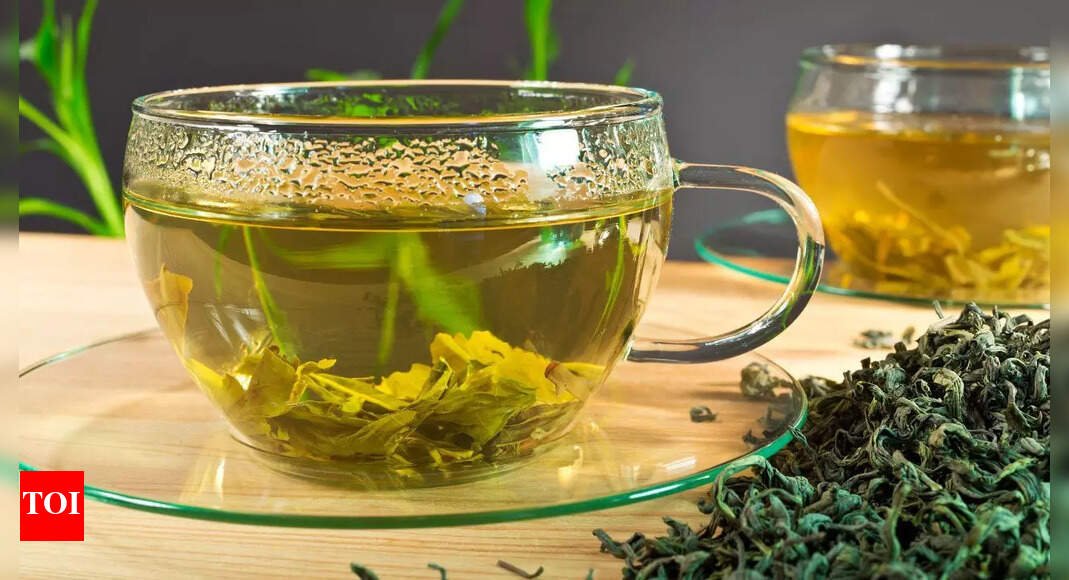Green tea isn’t for everyone: 6 types of people who should avoid drinking it due to side effects | – Times of India

Green tea is often praised as a superdrink, loaded with antioxidants, metabolism-boosting catechins, and natural energy from caffeine. It’s marketed as a healthy go-to for weight loss, detox, and overall wellbeing. But despite its many benefits, green tea isn’t suitable for everyone. In some cases, it can do more harm than good, especially if consumed in excess or by people with certain health conditions. From digestive irritation to nutrient interference and overstimulation, the side effects are real. Before adding green tea to your daily routine, here’s what you need to know about who should avoid it and why moderation is essential.
Green tea isn’t always as harmless as it seems: Why it may not suit everyone
Green tea contains caffeine, tannins, and catechins, natural compounds that can impact the body in both positive and negative ways. While caffeine provides a mild energy boost, it can also lead to restlessness, anxiety, and sleep problems in sensitive individuals. Tannins may irritate the stomach lining and interfere with the absorption of nutrients like iron. Catechins, though known for their antioxidant properties, can also reduce iron absorption and may affect liver health if consumed in large amounts. For most people, 2–3 cups a day is safe, but beyond that, these compounds can trigger unwanted side effects.
Common side effects of drinking too much green tea
- Headaches or migraines: Too much caffeine can overstimulate the brain and trigger headaches, particularly in sensitive individuals.
- Nervousness and restlessness: High caffeine levels may cause anxiety, jitters, and an inability to stay calm or focused.
- Insomnia or poor sleep: Drinking green tea late in the day can disrupt your sleep cycle by keeping your brain alert.
- Nausea or upset stomach: Tannins in green tea can irritate the stomach lining, especially when taken on an empty stomach.
- Vomiting or diarrhoea: Excessive intake may overstimulate digestion, leading to stomach discomfort, loose motions, or vomiting.
- Rapid or irregular heartbeat: Caffeine can increase your heart rate or cause palpitations, particularly in those with heart issues.
- Heartburn or acid reflux: Green tea can raise stomach acid, worsening symptoms for those prone to acidity.
- Dizziness or lightheadedness: Caffeine can cause blood pressure changes or dehydration, leading to a sensation of faintness.
Think twice before drinking green tea: 6 types of people who should avoid it
People with stomach sensitivity or acid reflux
Green tea increases the production of stomach acid due to the tannins it contains. This can lead to discomfort, bloating, constipation, or worsening of acid reflux and ulcers, especially when green tea is consumed on an empty stomach. Individuals with gastritis, peptic ulcers, or sensitive digestion should drink green tea only after meals or in between meals—not first thing in the morning.
People with iron deficiency or anaemia
Green tea may hinder the body’s ability to absorb non-heme iron, the kind found in plant-based foods, eggs, and dairy. For people already low in iron or diagnosed with anaemia, this effect can worsen symptoms. To reduce the impact, it’s best to drink green tea between meals instead of during them. Including vitamin C-rich foods like lemon or citrus fruits in the same meal can also help boost iron absorption.
Pregnant and breastfeeding women
During pregnancy and breastfeeding, consuming large amounts of green tea is not recommended. Green tea contains caffeine, which can increase the risk of miscarriage and affect the baby’s development if taken in excess. Catechins in green tea may interfere with folic acid absorption, while caffeine can pass into breast milk and overstimulate the infant. Experts recommend limiting intake to no more than 2 cups a day during these sensitive periods.
People sensitive to caffeine
If you are naturally sensitive to caffeine, even a small amount can trigger symptoms like restlessness, rapid heartbeat, irritability, or shakiness. High caffeine intake can also reduce calcium absorption, weakening bones over time. People with caffeine sensitivity should limit green tea to one cup a day or consider switching to a decaffeinated or herbal alternative.
Children
Green tea is not suitable for children. The caffeine content can overstimulate their nervous system, while tannins may block the absorption of key nutrients such as proteins and fats, which are vital for their growth and development. For these reasons, it’s best to avoid giving green tea to children.
People with certain health conditions
Green tea should be avoided or consumed with caution if you have certain medical conditions. It may worsen symptoms in those with anxiety disorders, bleeding disorders, heart rhythm problems, or diabetes. People with IBS or diarrhoea may find their symptoms worsen with green tea. It can also raise eye pressure in individuals with glaucoma and potentially worsen liver disease, especially when taken in the form of concentrated extracts. Those with osteoporosis should also be careful, as green tea may cause the body to lose calcium through urine.Green tea is a healthy beverage for many, but it’s not a one-size-fits-all remedy. While it contains antioxidants like catechins and offers benefits such as improved metabolism and heart health, it also comes with potential side effects. Caffeine and tannins in green tea can cause headaches, restlessness, and digestive issues and interfere with sleep, especially when consumed in large amounts or on an empty stomach. It may also reduce iron absorption and trigger acid reflux or nausea in some people.Moreover, green tea can interact negatively with stimulant medications like amphetamines, nicotine, and certain prescriptions, potentially overstimulating the heart or nervous system. To stay safe, stick to 2–3 cups a day, let your tea cool before drinking, and avoid taking it with iron-rich meals. If you’re pregnant, breastfeeding, or managing a medical condition, always consult your doctor. Like most health habits, moderation and mindfulness are key to enjoying green tea safely.Also Read: 8 everyday toxins that could be silently damaging your gut, liver, and hormones
var _mfq = window._mfq || [];
_mfq.push([“setVariable”, “toi_titan”, window.location.href]);
!(function(f, b, e, v, n, t, s) {
function loadFBEvents(isFBCampaignActive) {
if (!isFBCampaignActive) {
return;
}
(function(f, b, e, v, n, t, s) {
if (f.fbq) return;
n = f.fbq = function() {
n.callMethod ? n.callMethod(…arguments) : n.queue.push(arguments);
};
if (!f._fbq) f._fbq = n;
n.push = n;
n.loaded = !0;
n.version = ‘2.0’;
n.queue = [];
t = b.createElement(e);
t.async = !0;
t.defer = !0;
t.src = v;
s = b.getElementsByTagName(e)[0];
s.parentNode.insertBefore(t, s);
})(f, b, e, ‘https://connect.facebook.net/en_US/fbevents.js’, n, t, s);
fbq(‘init’, ‘593671331875494’);
fbq(‘track’, ‘PageView’);
};
function loadGtagEvents(isGoogleCampaignActive) {
if (!isGoogleCampaignActive) {
return;
}
var id = document.getElementById(‘toi-plus-google-campaign’);
if (id) {
return;
}
(function(f, b, e, v, n, t, s) {
t = b.createElement(e);
t.async = !0;
t.defer = !0;
t.src = v;
t.id = ‘toi-plus-google-campaign’;
s = b.getElementsByTagName(e)[0];
s.parentNode.insertBefore(t, s);
})(f, b, e, ‘https://www.googletagmanager.com/gtag/js?id=AW-877820074’, n, t, s);
};
function loadSurvicateJs(allowedSurvicateSections = []){
const section = window.location.pathname.split(‘/’)[1]
const isHomePageAllowed = window.location.pathname === ‘/’ && allowedSurvicateSections.includes(‘homepage’)
const ifAllowedOnAllPages = allowedSurvicateSections && allowedSurvicateSections.includes(‘all’);
if(allowedSurvicateSections.includes(section) || isHomePageAllowed || ifAllowedOnAllPages){
(function(w) {
function setAttributes() {
var prime_user_status = window.isPrime ? ‘paid’ : ‘free’ ;
var geoLocation = window?.geoinfo?.CountryCode ? window?.geoinfo?.CountryCode : ‘IN’ ;
w._sva.setVisitorTraits({
toi_user_subscription_status : prime_user_status,
toi_user_geolocation : geoLocation
});
}
if (w._sva && w._sva.setVisitorTraits) {
setAttributes();
} else {
w.addEventListener(“SurvicateReady”, setAttributes);
}
var s = document.createElement(‘script’);
s.src=”https://survey.survicate.com/workspaces/0be6ae9845d14a7c8ff08a7a00bd9b21/web_surveys.js”;
s.async = true;
var e = document.getElementsByTagName(‘script’)[0];
e.parentNode.insertBefore(s, e);
})(window);
}
}
window.TimesApps = window.TimesApps || {};
var TimesApps = window.TimesApps;
TimesApps.toiPlusEvents = function(config) {
var isConfigAvailable = “toiplus_site_settings” in f && “isFBCampaignActive” in f.toiplus_site_settings && “isGoogleCampaignActive” in f.toiplus_site_settings;
var isPrimeUser = window.isPrime;
var isPrimeUserLayout = window.isPrimeUserLayout;
if (isConfigAvailable && !isPrimeUser) {
loadGtagEvents(f.toiplus_site_settings.isGoogleCampaignActive);
loadFBEvents(f.toiplus_site_settings.isFBCampaignActive);
loadSurvicateJs(f.toiplus_site_settings.allowedSurvicateSections);
} else {
var JarvisUrl=”https://jarvis.indiatimes.com/v1/feeds/toi_plus/site_settings/643526e21443833f0c454615?db_env=published”;
window.getFromClient(JarvisUrl, function(config){
if (config) {
const allowedSectionSuricate = (isPrimeUserLayout) ? config?.allowedSurvicatePrimeSections : config?.allowedSurvicateSections
loadGtagEvents(config?.isGoogleCampaignActive);
loadFBEvents(config?.isFBCampaignActive);
loadSurvicateJs(allowedSectionSuricate);
}
})
}
};
})(
window,
document,
‘script’,
);
[title_words_as_hashtags




